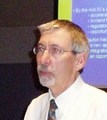FLASHBACK TO 2005: City of Surrey hosted regional Green Infrastructure Consultation Workshop to launch provincial initiative
Note to Reader:
In April 2013, the Partnership for Water Sustainability in BC recognized the City of Surrey as a Champion Supporter of the Partnership. The presentation of a framed “letter of recognition” to Mayor and Council provided the opportunity to reflect on the historical and provincial significance of successive transformational events hosted by the City over the past decade.
The vignette presented below is extracted from Getting Green Infrastructure “Built Right”: City of Surrey has Moved Beyond Pilot Projects to a Broader Watersheds Objectives Approach. Note that the vignette incorporates supplementary detail that expands on the significance of a consultation workshop hosted by the Surrey in May 2005.
Convening for Action Consultation in Metro Vancouver
Branded as Green Infrastructure: How Can We Help You Help Us Help You, the Consultation Workshop was organized in collaboration with the Metro Vancouver Regional Engineers Advisory Committtee (REAC).
 “Achieving higher levels of ecological systems protection and overall environmental well-being is being successfully pursued through changes to existing land use regulations, design guidelines and construction standards”, observed Paul Ham, Chair of the Green Infrastructure Partnership, when he announcing the workshop at a REAC meeting. Prior to his retirement in 2008, he was the General Manager of the Engineering Department for the City of Surrey.
“Achieving higher levels of ecological systems protection and overall environmental well-being is being successfully pursued through changes to existing land use regulations, design guidelines and construction standards”, observed Paul Ham, Chair of the Green Infrastructure Partnership, when he announcing the workshop at a REAC meeting. Prior to his retirement in 2008, he was the General Manager of the Engineering Department for the City of Surrey.
The Metro Vancouver workshop was the third event in a series of events to rollout the Convening for Action in British Columbia initiative. The first two were held in conjunction with conferences held in the Okanagan in Kelowna and Penticton in February and April, respectively.
Consultation Outcome
“The workshop demonstrated how local government practioners in Metro Vancouver are meeting the challenge of moving from planning to action. By bringing people together to share their experiences, we believe effective implementation of the design with nature principles can be addressed through practical changes,” Paul Ham stated afterwards.
“The workshop atmosphere was upbeat with participants enthusiastically stressing that the number of success stories is growing. There are hurdles to overcome, but they are not insurmountable. The clear message was to make outreach and practitioner education the #1 priority.”
“As an outcome of what we learned at this workshop, the Partnership did a complete re-think of our work plan. We concludeds that guides by themselves are not sufficient to move green infrastructure from the exception to the norm. Rather, the process to create, promote and implement a regional vision for ‘designing with nature’ depends on having an outreach and continuing education program that reaches a range of target of audiences and builds capacity.”
Format for Learning and Sharing
The workshop gave participants an opportunity to share their successes and discuss the challenges they faced and dealt with in achieving on the ground green infrastructure results in their communities. Ten Metro Vancouver municipalities participated. The workshop was organized in three parts:
- HELP US through Roundtable Sharing: Who is Doing What and What has Worked (or Not)?
- HELP YOU though an understanding of Leading and Managing Change.
- HELP US through Roundtable Input: What should the proposed Green Infrastructure Communication Guides look like?
 “The discussion that day in May underscored that there was critical mass for moving forward with an interactive and proactive approach to communication of the design with nature vision; and that this can be achieved through an array of educational tools that can inform change,” added Kim Stephens, Partnership Executive Director.
“The discussion that day in May underscored that there was critical mass for moving forward with an interactive and proactive approach to communication of the design with nature vision; and that this can be achieved through an array of educational tools that can inform change,” added Kim Stephens, Partnership Executive Director.
To Learn More:
Workshop outcomes are documented in the report titled The Green Infrastructure Partnership: Convening for Action in British Columbia (July 2005 Progress Report).



